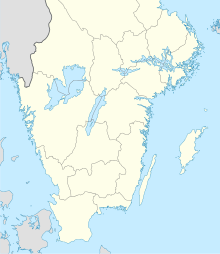Battle of Haraker
| Battle of Haraker | |||||||
|---|---|---|---|---|---|---|---|
| Part of the 1463–1464 Swedish uprising against Christian I | |||||||
|
|||||||
| Belligerents | |||||||
|
|
Swedish unionists |
||||||
| Commanders and leaders | |||||||
| Bishop Kettil Karlsson Sten Sture the Elder |
King Christian I | ||||||
| Strength | |||||||
| unknown | unknown | ||||||
| Casualties and losses | |||||||
| unknown | 1200 killed (Swedish estimate) | ||||||
|
|
|||||||
The Battle of Haraker was fought on 17 April 1464 at the village of Haraker, Västmanland, approximately 20 kilometers north of the city of Västerås in Sweden. The Swedish separatist army, under the command of the Bishop of Linköping, Kettil Karlsson, defeated King Christian I's Danish army.
The battle was part of a long series of conflicts and civil wars between unionists and separatists during the Kalmar Union era in the 15th century. The Danish King Christian I of the house of Oldenburg had ruled Sweden supported by the unionist party since 1457, with the deposed Swedish rival King Charles Canutesson, of the house of Bonde, living in exile in Danzig. However, there was widespread opposition to Christian's rule, and Christian travelled to Sweden to act against the rumours of Charles's imminent return. When the Archbishop of Uppsala, Jöns Bengtsson Oxenstierna, acting as viceroy on behalf of King Christian during the King's stay in the Swedish province of Finland, gave in to tax protestors and postponed the collection of a ship tax from the peasantry of Mälardalen, King Christian had Jöns Bengtsson imprisoned and brought to Copenhagen on his return in August 1463.
The news of the Archbishop's imprisonment caused an uprising among the peasantry of Mälardalen, led by the Archbishop's Oxenstierna and Vasa relatives in the high nobility. Peasant militia from Uppland marched on , but were crushed by the unionist troops under the command of Lord High Constable Ture Turesson Bielke on Helgeandsholmen outside the northern gates of Stockholm, in the Battle of Helgeandsholmen on 21 August 1463.
...
Wikipedia

